- Home
- Mack Reynolds
Pacifist
Pacifist Read online
Pacifist
Mack Reynolds
Dedicated men can often employ the most unethical of tactics—and sometimes with a clear conscience… Here is a tale of such a man, but one who developed a conscience.
Pacifist
by Mack Reynolds
It was another time, another space, another continuum.
Warren Casey called, “Boy! You’re Fredric McGivern, aren’t you?”
The lad stopped and frowned in puzzlement. “Well, yes, sir.” He was a youngster of about nine. A bit plump, particularly about the face.
Warren Casey said, “Come along, son. I’ve been sent to pick you up.”
The boy saw a man in his mid-thirties, a certain dynamic quality behind the facial weariness. He wore a uniform with which young McGivern was not familiar, but which looked reassuring.
“Me, sir?” the boy said. “You’ve been sent to pick me up?”
“That’s right, son. Get into the car and I’ll tell you all about it.”
“But my father said…”
“Your father sent me, son. Senator McGivern. Now, come along or he’ll be angry.”
“Are you sure?” Still frowning, Fredric McGivern climbed into the helio-car. In seconds it had bounded into the second level and then the first, to speed off to the southwest.
It was more than an hour before the kidnapping was discovered.
Warren Casey swooped in, dropped two levels precipitately and brought the helio-car down in so dainty a landing that there was no perceptible touch of air cushion to garage top.
He fingered a switch with his left hand, even as be brought his right out of his jacket holding a badly bummed-out pipe. While the garage’s elevator sunk into the recess below, he was loading the aged briar from an equally ancient pouch.
In the garage, Mary Baca was waiting nervously. She said, even though she must have been able to see the boy, “You got him?”
“That’s right.” Casey said. “I’ve given him a shot. He’ll be out for another half hour or so. Take over, will you, Mary?”
The nurse looked down at the crumpled figure bitterly. “It couldn’t have been his father. We have to pick on a child.”
Casey flicked a quick glance at her as he lit the pipe. “It’s all been worked out, Mary.”
“Of course,” she said. Her voice tightened. “I’ll have him in the cell behind the rumpus room.”
Down below he went to the room that had been assigned him and stripped from the uniform. He went into the bath and showered thoroughly, washing out a full third of the hair that had been on his head and half the color in that which remained. He emerged from the bath, little refreshed and some five years older.
He dressed in an inexpensive suit not overly well pressed and showing wear. His shirt was not clean, as though this was the second day he had worn it, and there was a food spot on his tie.
At the small desk he picked up an automatic pencil and clipped it into the suit’s breast pocket and stuffed a bulky notebook into a side pocket. He stared down at the gun for a moment, then grimaced and left it. He departed the house by the front door and made his way to the metro escalator.
The nearest metro exit was about a quarter of a mile from Senator McGivern’s residence and Warren Casey walked the distance. By the time he arrived he had achieved a cynical quality in his expression) of boredom. He didn’t bother to look up into the face of whoever opened the door.
“Jakes,” he said. “H.N.S. McGivern expects me.”
“H.N.S.?” the butler said stiffly.
“Hemisphere News. Hemisphere News Service,” Warren Casey yawned. “Fer crissakes, we gonna stand here all day? I gotta deadline.”
“Well, step in here, sir. I’ll check.” The other turned and led the way.
Casey stuck a finger into his back. His voice went flat. “Don’t get excited and maybe you won’t get hurt. Just take me to the Senator, see? Don’t do nothing at all that might make me want to pull this trigger.”
The butler’s face was gray. “The senator is in his study. I warn you… sir… the police shall know of this immediately.”
“Sure, sure, Mac. Now just let’s go to the study.”
“It’s right in there… sir.”
“Fine,” Casey said. “And what’s that, under the stairway?”
“Why, that’s a broom closet. The downstairs maid’s broom…”
Casey brought his flat hand around in a quick clip. The servant folded up with a lung-emptying sigh and Casey caught him before he hit the floor, pushed and wedged him inside. He darted a hand to a vest pocket and brought forth a syrette. “That’ll keep you out for a couple of hours,” he muttered, closing the closet door.
He went over to the heavy door which the butler had indicated as Senator McGivern’s study, and knocked on it. In a moment it opened and a husky in his mid-twenties, nattily attired and of obvious self-importance, frowned at him.
“Yes?” he said.
“Steve Jakes of Hemisphere News,” Warren Casey said. “The editor sent me over…” As he talked, he sidestepped the other and emerged into the room beyond.
Behind the desk was an older edition of nine-year-old Fredric McGivern. A Fredric McGivern at the age of perhaps fifty, with what had been boyish plump cheeks now gone to heavy jowls.
“What’s this?” he growled.
Casey stepped further into the room. “Jakes, Senator. My editor…”
Senator Phil McGivern’s ability included cunning and a high survival factor. He lumbered to his feet. “Walters! Take him!” he snapped. “He’s a fake!” He bent over to snatch at a desk drawer.
Walters was moving, but far too slowly.
Warren Casey met him half way, reached forward with both hands and grasped the fabric of the foppish drape suit the secretary wore. Casey stuck out a hip, twisted quickly, turning his back halfway to the other. He came over and around, throwing the younger man heavily to his back.
Casey didn’t bother to look down. He stuck a hand into a side pocket, pointed a finger at McGivern through the cloth.
The other’s normally ruddy face drained of colour. He fell back into his chair.
Warren Casey walked around the desk and brought the gun the other had been fumbling for from the drawer. He allowed himself a deprecating snort before dropping it carelessly into a pocket.
Senator Phil McGivern was no coward. He glowered at Warren Casey. “You’ve broken into my home—criminal,” he said. “You’ve assaulted my secretary and threatened me with a deadly weapon. You will be fortunate to be awarded no more than twenty years.”
Casey sank into an easy chair so situated that he could watch both McGivern and his now unconscious assistant at the same time. He said flatly, “I represent the Pacifists, Senator. Approximately an hour ago your son was kidnapped. You’re one of our top priority persons. You probably realize the implications.”
“Fredric! You’d kill a nine-year-old boy!”
Casey’s voice was flat. “I have killed many nine-year-old boys, Senator.”
“Are you a monster!”
“I was a bomber pilot. Senator.”
The other, who had half risen again, slumped back into his chair.
“But that’s different.”
“I do not find it so.”
In his hard career, Phil McGivern had faced many emergencies. He drew himself up now. “What do you want—criminal? I warn you, I am not a merciful man. You’ll pay for this, Mr.…”
“Keep calling me Jakes, if you wish,” Casey said mildly. “I’m not important. Just one member of a widespread organization.”
“What do you want?” the Senator snapped.
“How much do you know about the Pacifists, McGivern?”
“I know it to be a band of vicious crimi
nals!”
Casey nodded agreeably. “It’s according to whose laws you go by. We have rejected yours.”
“What do you want?” the Senator repeated.
“Of necessity,” Casey continued, evenly, “our organization is a secret one; however, it contains some of the world’s best brains, in almost every field of endeavour, even including elements in the governments of both Hemispheres.”
Phil McGivern snorted his contempt.
Casey went on, an eye taking in the fact that Walters, laid out on the floor, had stirred and groaned softly. “Among our number are some capable of charting world development. By extrapolation, they have concluded that if your policies are continued nuclear war will break out within three years.”
The other flushed in anger, finding trouble in controlling his voice. “Spies! Subversives! Make no mistake about it. Jakes, as you call yourself, we realize you’re nothing more than cat’s-paws for the Polarians.”
The self-named Pacifist chuckled sourly. “You should know better. Senator. Our organization is as active on the Northern Hemisphere as it is on this one.” Suddenly he came quickly to his feet and bent over Walters who had begun to stir. Casey’s hand flicked out and clipped the other across the jawbone. The secretary collapsed again, without sound.
Warren Casey returned to his chair. “The point is that our experts are of the opinion that you’ll have to drop out of politics. Senator McGivern. I suggest a resignation for reasons of health within the next week.”
There was quick rage, then steaming silence while thought processes went on. “And Fredric?” McGivern growled finally. Casey shrugged. “He will be freed as soon as you comply.”
The other’s eyes narrowed. “How do you know I’ll stick to my promise? A contract made under duress has no validity.”
Casey said impatiently, “Having Fredric in our hands now is a minor matter, an immediate bargaining point to emphasize our position. Senator, we have investigated you thoroughly. You have a wife of whom you are moderately fond, and a mistress whom you love. You have three adult children by your first wife, and four grandchildren. You have two children by your second wife, Fredric and Janie. You have a living uncle and two aunts, and five first cousins. Being a politician, you have many surface friends, which we shall largely ignore, but you also know some thirty persons who mean much to you.”
McGivern was beginning to adjust to this abnormal conversation. He growled, “What’s all this got to do with it?”
Warren Casey looked into the other’s eyes. “We shall kill them, one by one. Shot at a distance with a rifle with telescopic sights. Blown up by bomb. Machine gunned, possibly as they walk down the front steps of their homes.”
“You’re insane! The police. The…”
Casey went on, ignoring the interruption. “We are in no hurry. Some of your children, your relatives, your friends, your mistress, may take to hiding in their panic. But there is no hiding—nowhere on all this world. Our organization is in no hurry, and we are rich in resources. Perhaps in the doing some of us will be captured or dispatched. It’s beside the point. We are dedicated. That’s all we’ll be living for, killing the people whom you love. When they are all gone, we will kill you. Believe me, by that time it will be as though we’re motivated by compassion. All your friends, your loved ones, your near-of-kin, will be gone.”
“We will kill, kill, kill—but in all it will be less than a hundred people. It will not be thousands and millions of people. It will only be your closest friends, your relatives, your children and finally you. At the end, Senator, you will have some idea of the meaning of war.”
By the end of this, although it was delivered in an almost emotionless voice, Phil McGivern was pushed back in his swivel chair as though from physical attack. No repeated, hoarsely, “You’re insane.”
Warren Casey shook his head. “No, it is really you, you and those like you, who are insane. Wrapped up in your positions of power, in your greed for wealth in the preservation of your privileges, you would bring us into a conflagration which would destroy us all. You are the ones who are insane.”
The Pacifist agent leaned forward. “Throughout history, Senator, there have been pacifists. But never such pacifists as we. Always, in the past, they have been laughed at or sneered at in times of peace, and imprisoned or worse in time of war.”
“Cowards,” Senator McGivern muttered in distaste.
Casey shook his head and chuckled. “Never, Senator. Don’t look for cowards among pacifists and conscientious objectors. It takes courage to buck the current of public opinion. A coward is often better off in the ranks and usually safer. In modem war, at least until the advent of nuclear conflict, only a fraction of the soldiers ever see combat. The rest are in logistics, in a thousand branches of behind the lines work. One man in twenty ever glimpses the enemy.”
McGivern snapped, “I’m not interested in your philosophy, criminal. Get to the point. I want my son back.”
That is the point. Senator. Today we Pacifists have become realists. We are willing to fight, to kill and to die, in order to prevent war. We are not interested in the survival of individuals, we are of the opinion that another war will destroy the race, and to preserve humanity we will do literally anything.”
McGivern thumped a heavy fist on his chair arm. “You fool! The Northern Hemisphere seeks domination of the whole world. We must defend ourselves!”
The Pacifist was shaking his bead again. “We don’t care who is right or wrong—if either side is. It finally gets to the point where that is meaningless. Our colleagues are working among the Polarians, just as we are working here in the Southern Hemisphere. Persons such as yourself, on the other side, are courting death just as you are by taking steps that will lead to war.”
Warren Casey stood. “You have one week in which to resign your office, Senator. If you fail to, you will never see your son Fredric again. And then, one by one, you will hear of the deaths of your relatives and friends.”
The Pacifist agent came quickly around the desk and the older man, in an effort to escape, pushed his chair backward and tried to come to his feet. He was too clumsy in his bulk. Warren Casey loomed over Mm, slipped a syrette into the other’s neck.
Senator Phil McGivern, swearing, fell to his knees and then tried to come erect. He never made it. His eyes first stared, then glazed, and he dropped back to the floor, unconscious.
Warren Casey bent momentarily over Walters, the secretary, but decided that he was safe for a time. He shot a quick look about the room. What had he touched? Had he left anything?
He strode quickly from the room, retracing the path by which the butler had brought him fifteen minutes earlier, and let himself out the front door.
“His cab pulled up before the aged, but well-preserved, mansion, and he dropped coins into the vehicle’s toll box and then watched it slip away into the traffic.
He walked to the door and let himself be identified at the screen. When the door opened he strolled through.
A young woman, her face so very earnest in manner that her natural prettiness was all but destroyed, sat at the desk.
Rising, she led the way and held the door open for him and they both entered the conference room. There were three men there at the table, all of them masked.
Casey was at ease in their presence. He pulled a chair up across from them and sat down. The girl took her place at the table and prepared to take notes.
The chairman, who was flanked by the other two, said, “How did the McGivern affair go, Casey?”
“As planned. The boy proved no difficulty. He is now at the hide-away in charge of Operative Mary Baca.”
“And the Senator?”
“As expected. I gave him full warning.”
“The secretary, Walters. He was eliminated?”
“Well, no. I left him unconscious.”
There was a silence.
One of the other masked men said, “The plan was to eliminate the secretary to give emp
hasis to the Senator as to our determination.”
Casey’s voice remained even. “As it worked out, it seemed expedient to follow through as I did.”
The chairman said, “Very well. The field operative works with considerable range of discretion. No one can foresee what will develop once an operation is under way.”
Warren Casey said nothing.
The second board member sighed. “But we had hoped that the sight of a brutal killing, right before him, might have shocked Phil McGivern into submission immediately. As it is now, if our estimates of his character are correct, the best we can hope for is capitulation after several of his intimates have been dispatched.”
Casey said wearily, “He will never capitulate, no matter what we do. He’s one of the bad ones.”
The third board member, who had not spoken to this point, said thoughtfully, “Perhaps his immediate assassination would be best.” The chairman shook his head. “No. We’ve thrashed this all out. We want to use McGivern as an example. In the future, when dealing with similar cases, our people will be able to threaten others with his fate. We’ll see it through, as planned.” He looked at Casey. “We have another assignment for you.”
Warren Casey leaned back in his chair, his face expressionless, aside from the perpetual weariness. “All right,” he said.
The second” board member took up an assignment sheet. “It’s a Priority One. Some twenty operatives are involved in all.” He cleared his voice. “You’ve had interceptor experience during your military career?”
Casey said, “A year, during the last war. I was shot down twice and they figured my timing was going, so they switched me to medium bombers.”
“Our information is that you have flown the Y-36G.”
“That’s right.” Casey wondered what they were getting to.
“The board officer said, “In two weeks the first class of the Space Academy graduates. Until now, warfare has been restricted to land, sea and air. With this graduation we will have the military erupting into a new medium.”
“I’ve read about it,” Casey said.

 Happy Ending
Happy Ending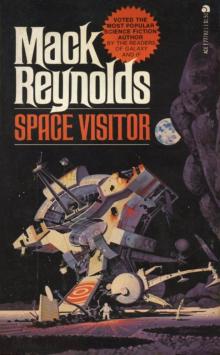 Space Visitor
Space Visitor A Kiss Before Loving
A Kiss Before Loving Episode on the Riviera
Episode on the Riviera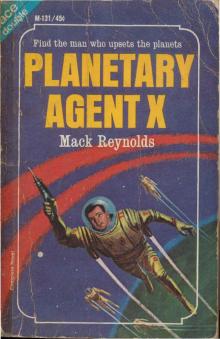 Planetary Agent X
Planetary Agent X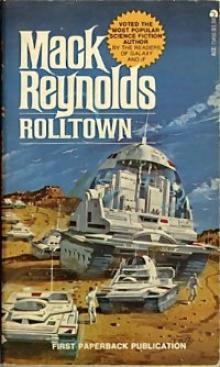 Rolltown bh-3
Rolltown bh-3 The Second Mack Reynolds Megapack
The Second Mack Reynolds Megapack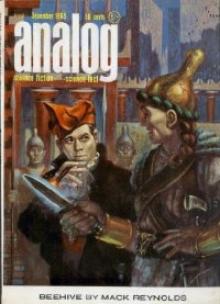 Dawnman Planet up-2
Dawnman Planet up-2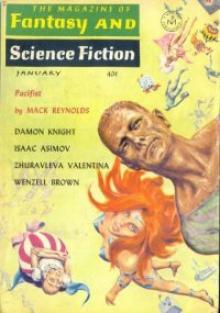 Pacifist
Pacifist The Other Time
The Other Time Once Departed
Once Departed IQ
IQ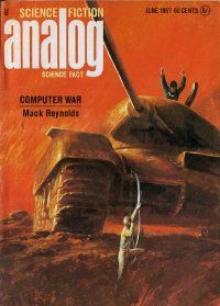 Computer War
Computer War Earth Unaware
Earth Unaware The Rival Rigelians up-3
The Rival Rigelians up-3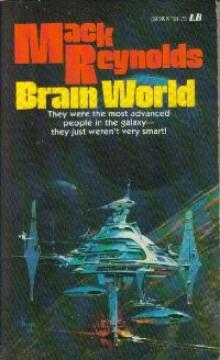 Brain World up-7
Brain World up-7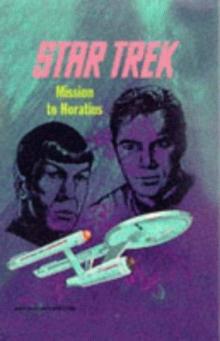 Star Trek - TOS - Mission to Horatius
Star Trek - TOS - Mission to Horatius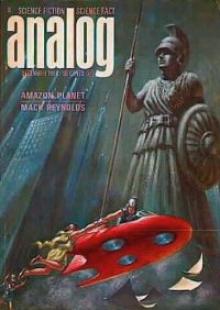 Amazon Planet up-5
Amazon Planet up-5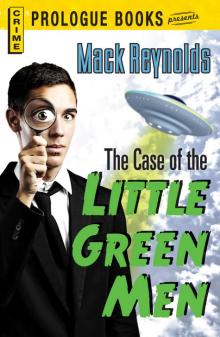 The Case of the Little Green Men
The Case of the Little Green Men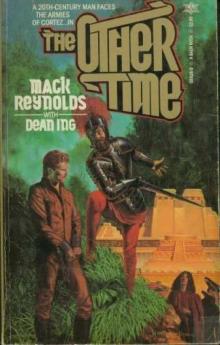 Other Time
Other Time The Mack Reynolds Megapack
The Mack Reynolds Megapack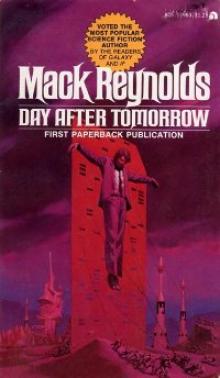 Day After Tomorrow
Day After Tomorrow The Devils & Demons MEGAPACK ®: 25 Modern and Classic Tales
The Devils & Demons MEGAPACK ®: 25 Modern and Classic Tales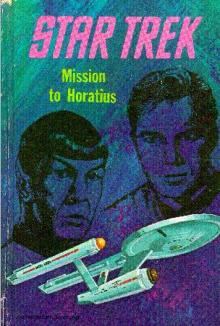 Mission to Horatius
Mission to Horatius Ability Quotient
Ability Quotient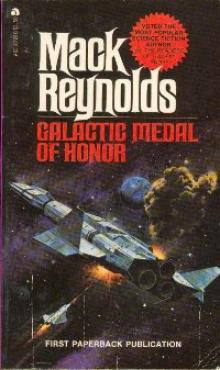 Galactic Medal of Honor
Galactic Medal of Honor Trojan Orbit
Trojan Orbit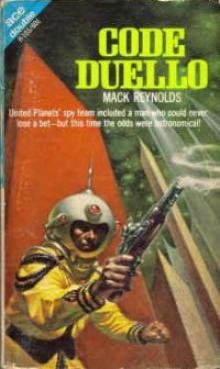 Code Duello up-4
Code Duello up-4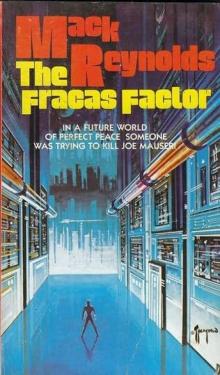 The Fracas Factor
The Fracas Factor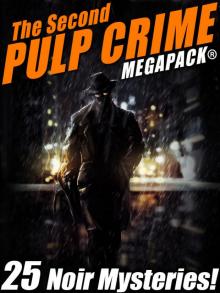 The Second Pulp Crime
The Second Pulp Crime Deathwish World
Deathwish World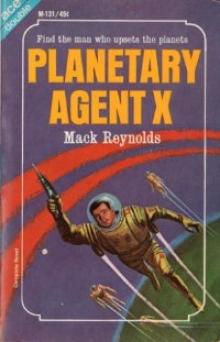 Planetary Agent X up-1
Planetary Agent X up-1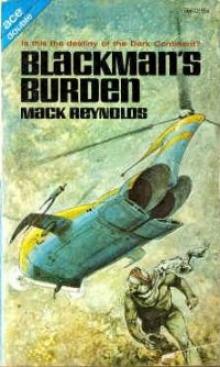 Blackman' Burden na-1
Blackman' Burden na-1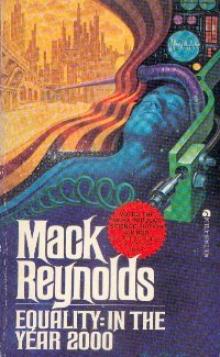 Equality: In the Year 2000 jw-2
Equality: In the Year 2000 jw-2 The Best Ye Breed na-3
The Best Ye Breed na-3 The Jet Set
The Jet Set The Rival Rigelians
The Rival Rigelians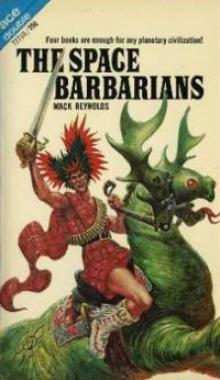 The Space Barbarians
The Space Barbarians